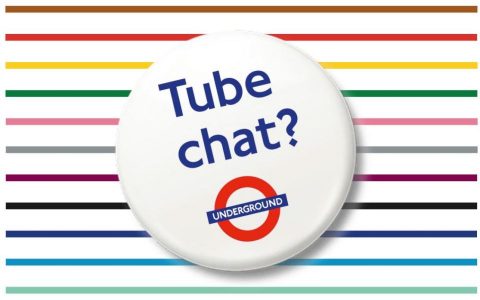Backlash Against London Tube Chat: 5 Reasons Why Londoners are Miserable - Dispatch Weekly
September 30, 2016 - Reading time: 7 minutes

The London tube chat campaign was bashed this week when “Tube chat?” badges were mocked, launching an anti-campaign on Twitter called: Shut Up Tube Chat.
The first campaign encouraged strangers to talk to one another by wearing a “Tube chat?” badge that was given out on platforms.
The campaign seems pertinent in an age where Britain was voted the loneliest capital of Europe according to a survey by the Office for National Statistics, 2014.
Despite being lonely, why are Londoners actively miserable, not wanting to engage with others?
#1 The Power of Politeness

British culture is a politeness society where ritualized behaviors, consideration to others, and saying the culturally acceptable sentiment, are endemic.
The stereotype of the “British upper lip” suggests that British people are not open with their thoughts, preferring to keep the status quo.
In a BBC article, one commenter said Brits were more passive-aggressive than Americans:
“I remember one or two contentious calls where it was amusing for me to hear how the British challenged one another on the phone in the most kind and polite way possible.”
#2 Tired of People
The population of London in 2016 is estimated to be as much as 8.63 million according to the Office for National Statistics.
The Talk to Me London campaign launched by American, Jonathan Dunne aims to get Londoners engaging, building “a friendlier city through encouraging small conversations between strangers.”
He admitted it was challenging to get commuters to take a pin:
“I would say it’s about an 80/20 split.”
“Twenty percent think it’s nice and about 80 percent of people think it’s terrible, worst idea ever.”
#3 Leave Me Alone Culture

The anti-campaign and Shut Up Tube Chat Twitter group made new leaflets saying, “Want nothing less than a ‘chat’ with one of your fellow passengers?
“Wear this badge to let them know that you’d rather drink a pint of bleach than talk with them.”
The badges spelled out “Don’t even think about it.”
#4 Loneliness and Social Media

A survey conducted last year by The Silver Line found that 2.5 million older people in Britain described themselves as lonely.
According to AXA PPP poll in 2014, 18-24 year olds are four times as likely to feel lonely “most of the time” as those aged over 70.
On commutes it is now easier to plug into phones and digital devices rather than deal with people.
Dating apps segregate people into faces and bios making talking to strangers or chatting to someone redundant.
#5 The Solitude of 1000 Commutes

According to the ONS, on Average we spend about a year of our lives getting to and from the office (or 10,634 hours).
Census data discovered that in 2003 the average UK commute was 45 minutes, today it is 54 minutes.
The context of a train carriage where morning rush hour involves people squashed in metal containers over long periods of time does not induce people to converse freely. Londoners will have to be content with their loneliness and “Don’t even think about it” badges.

DW Staff
David Lintott is the Editor-in-Chief, leading our team of talented freelance journalists. He specializes in covering culture, sport, and society. Originally from the decaying seaside town of Eastbourne, he attributes his insightful world-weariness to his roots in this unique setting.




